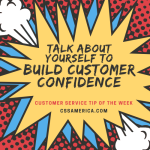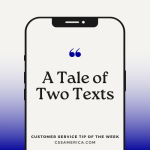When conducting research for a local government CSS client, we interviewed and conducted surveys with many of their customers. We analyzed the results of the research based on those who had a great experience v. those who did not. We uncovered that there were distinct differences between customers who felt valued and those who did not feel valued by the organization.
Empathize v. Defend. When the customers felt like the organization was listening to them, trying to understand their situation, trying to learn about their unique issue or goal or concern, the customer felt valued. When dealing with an issue, if the customer felt like the employee was more focused on defending themselves or the policy or the procedure, the customer felt devalued.
Proactive v. Reactive. When the employee would suggest alternative options or provide a follow-up call to the customer, when the employee would share information about next steps, the customer felt valued. However, if the customer had to reach out or they’d never hear from the organization, the customer felt devalued.
Work Together v. Win a Debate. When there was a need to be addressed or a goal to be achieved, if the customer felt like the employee was trying to figure out a way that they could work with the customer to identify a game plan, the customer felt valued. When the customer felt like the conversation lingered too much on what facts were correct and which were incorrect, who was right and who was wrong in a particular situation, the customer did not feel valued.
Find Solution v. Deflect Blame. When the issue needed a resolution, if the employee was focused on figuring out what would work best for the customer, the customer felt valued. However, if the customer felt like the employee was more focused on making sure they were not held responsible for the issue, the customer felt devalued.
Avoid being defensive, being purely reactive, debating the customer, and focusing on deflecting blame.
To help the customer feel valued, empathize, be proactive, work together, and find a solution.
Signup for FREE Tips! Contact Us More Resources for You Visit Our Home Page
















 As sports teams and organizations across the world are gearing up to start play without fans, these same organizations are also determining what that fan experience is going to be when fans start attending again. Many sports organizations are focused on locking in revenue from existing fans – keeping those season ticket payments coming in on schedule – or more operationally looking at how the facilities and the fans can be kept safe and healthy.
As sports teams and organizations across the world are gearing up to start play without fans, these same organizations are also determining what that fan experience is going to be when fans start attending again. Many sports organizations are focused on locking in revenue from existing fans – keeping those season ticket payments coming in on schedule – or more operationally looking at how the facilities and the fans can be kept safe and healthy.







